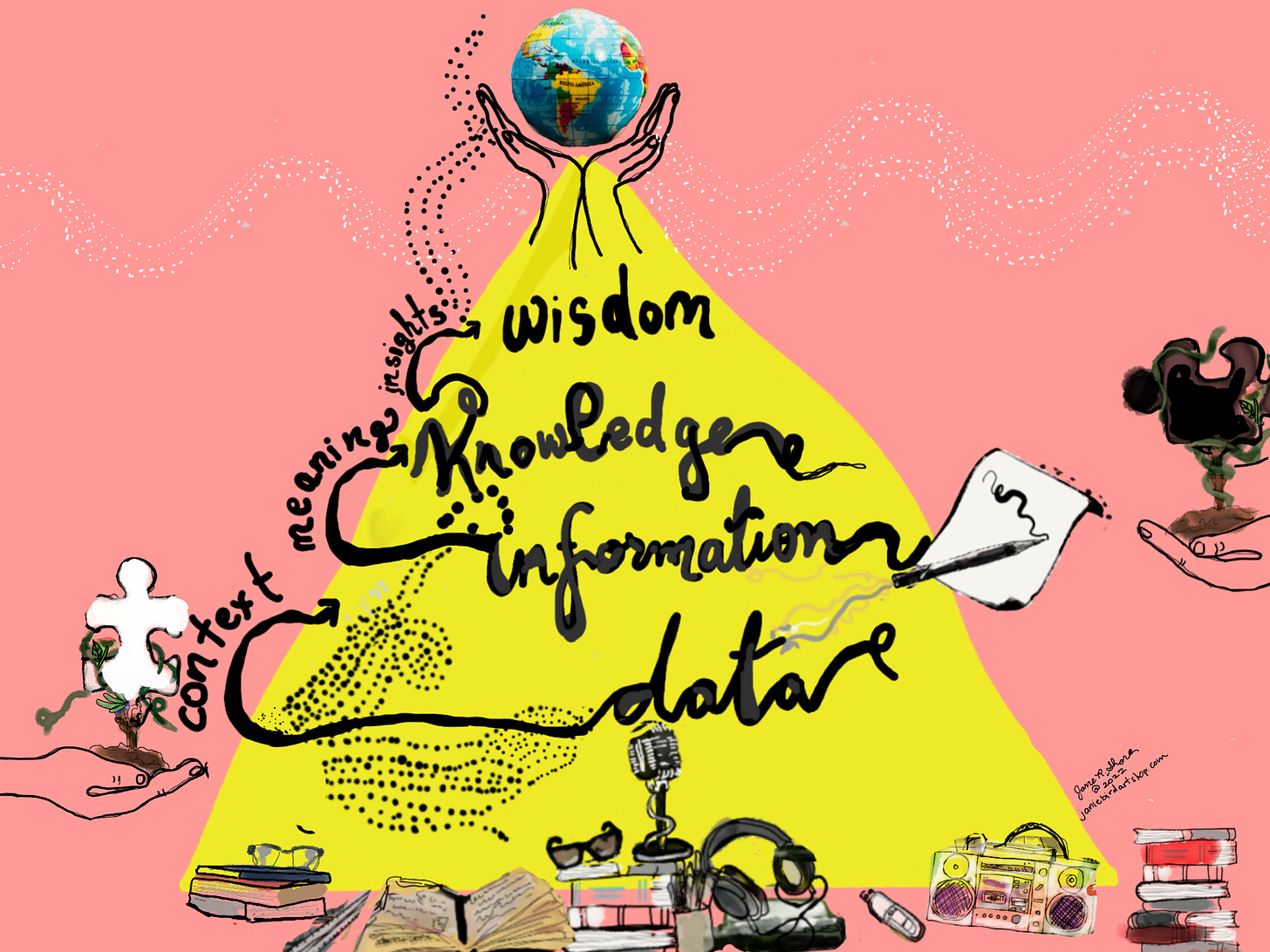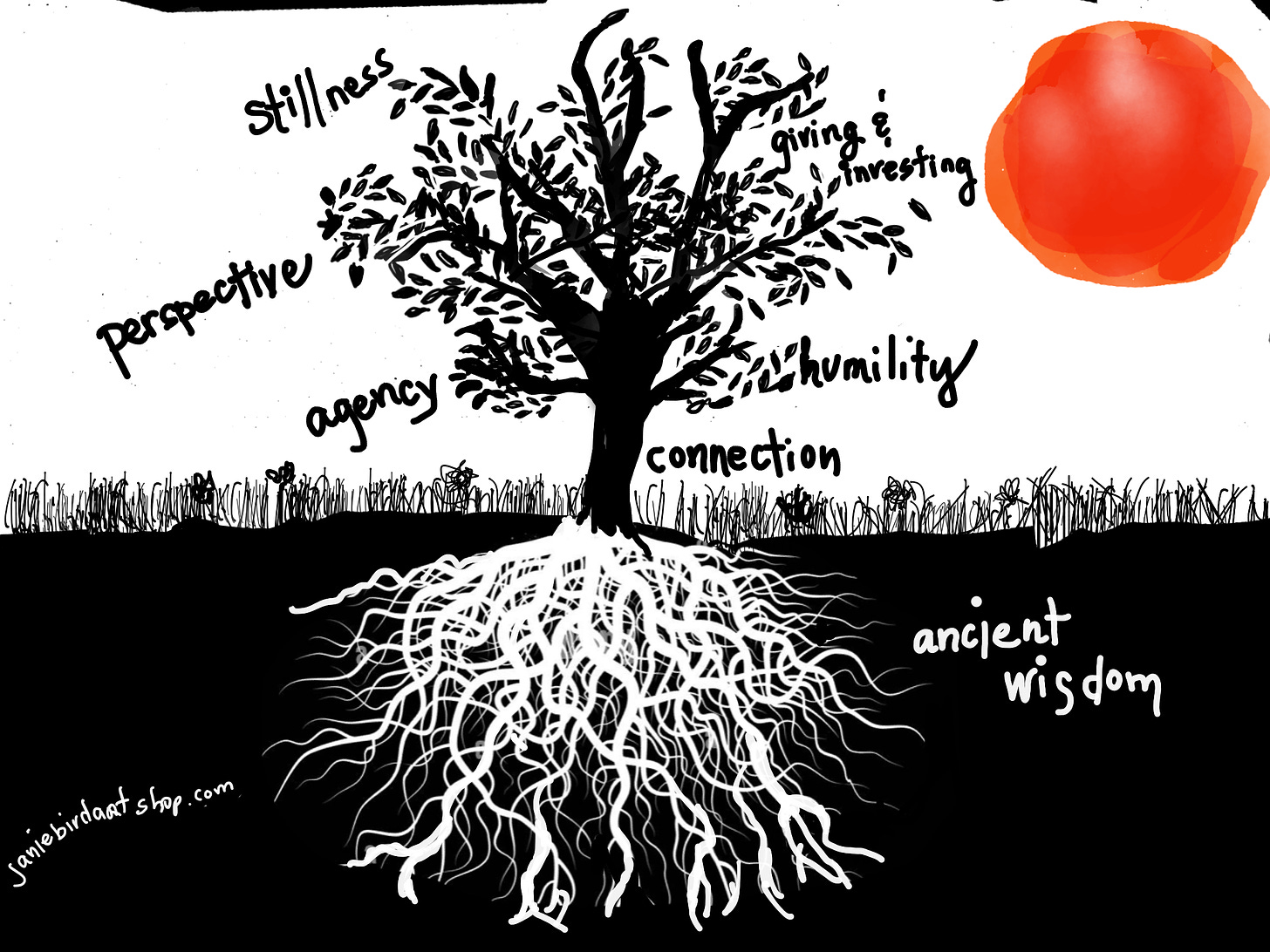“In the face of headwinds, I see our task as educators as twofold: to lay the groundwork for wisdom by consciously aligning our pedagogy with its most essential attributes and to use examples of great wisdom -- past and, most especially, present -- to waken in our students a hunger for it.” Peter Starr
If you like what read, please click the heart above. ♥️ I’d love to hear from you.
Many people use the concepts of knowledge and wisdom interchangeably. The thought is if you are a knowledgeable person, you are a wise person. But in truth, these are not at all the same. To move from knowledge to wisdom requires insights and applications, meaning making and iteration. And while the rate of knowledge is growing exponentially, in most parts of the world, we’ve lost our collective wisdom.
Welcome to School of Thought, a bi-monthly newsletter featuring big evidence based ideas and how to make them usable, with visuals and inspiring links. I’m glad you’re here!
The Big Idea
We need to create spaces for students to gain wisdom. Wise thinking requires curiosity, agency, and listening. All are things we value and envision for schools.
So how do we consciously align our pedagogy with the essential attributes of wisdom?
First, what does it mean to have great wisdom?
Wise people are humble; as it takes humility to recognize the limitations of their knowledge.
Wise people have the ability to see the big picture. They are able to put things in perspective; to rise above their personal viewpoint and observe a situation from many different angles (thus avoiding simplistic black-and-white thinking).
People acknowledged for their wisdom are reflective, introspective and tolerant of ambiguity.
Wise people know how to manage negative emotions, and possess both empathy and compassion; qualities that differentiate them in an interpersonal context.
Wise people are attuned to what constitutes harmony, and meaningful life.
We need to create spaces to grow qualities that lead to wisdom.

6 Features of Wisdom Schools Need
Educators, coaches, and mentors can play a significant role, not only by assisting with the dissemination of knowledge but by helping those searching for wisdom work through challenging experiences and encouraging them to work on emotional awareness, relational skills and mindfulness.
Here are a few of the big ideas related to wisdom that school culture can support.
1. Giving and Investing
If we were to listen to the wisdom keepers, we would adapt a collectivist mindset. The idea is that we need to both give and invest in service of a better life for all.
Giving and investing is a demonstration of wisdom.
2. Sense of Ownership of Ourselves, and the Collective
“By encouraging learners to have more control over their learning, more agency, educators will support them in being lifelong learners, engaged humanitarians and empathetic people.” Via Edutopia, by Trevor MacKenzie
Agency grows wisdom.
3. Perspective Expansion
When we learn to think wisely, we understand things from diverse points of view across time and space. For example, what one group might call a “settler,” another might call an “invader.” Causes of war, tenets of peace, who won, how it happened - our stories all have perspective.
Perspective expansion grows wisdom.

4. Stillness in our Minds
We know that ideas come together when we are able to let our minds wander. When our mind can still itself, it connects the dots.
There is a term called presencing, living in the present. It happens when you can slow down to think fast. It is the mind of the surgeon who can block out the chaos to focus on saving lives, the mind of the artist who can create visuals from thoughts, the mind of a problem solver who can take a walk to find the signal through the noise.
We need more stillness in our lives, and especially in schools.
Stillness grows wisdom.
5. Humility
Remaining humble- listening to different points of view, acknowledging we do not know everything - this is wisdom.
Humility grows wisdom.
6. Collective Connection
This one feels the most lost lately. Indigenous people around the world, whether it is in the tundra, the savannah, the deserts, the highlands or the Amazon rainforest have lived connected. We used to understand innately the power of the tribe, and we need to reconnect with the mindset and each other.
Collective connection grows wisdom.
Making Big Ideas Usable
At the start of the school year, many classrooms draft community agreements. Here are a few Wisdom-Driven Community Agreements inspired by Teach Thought. I wonder what creative approaches you might have to weave these in to our new year.
We value our questions over our answers.
We see how our perspective impacts everything–‘reality,’ for example.
We instinctively compare what we believe we know with what there is still to learn.
We see the relationships between ourselves and those around us as complex, important, and constantly changing.
We seek to find the bias first in our thinking, then in others.
Photo by S O C I A L . C U T on Unsplash
How might schools support wisdom building? What is missing?
For more School of Thought, click here.








A beautiful post. Thank you, yet again, for this.
I would love to point to a specific piece of curriculum I use that, over the course of a year, develops so many of the aspects in learners that you've noted here.
I've used the Touchstones Discussion Project for over 25 years. Between this post and the post your wrote today (on People Centeredness), I think you'll find a huge amount of resonance. www.touchstones.org.